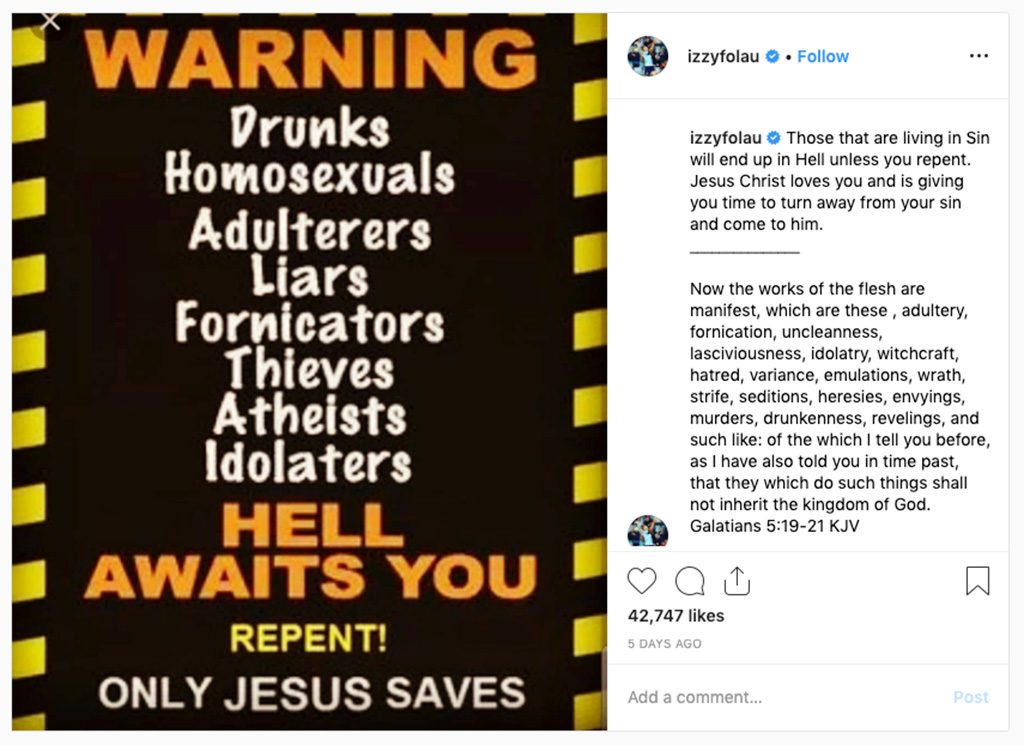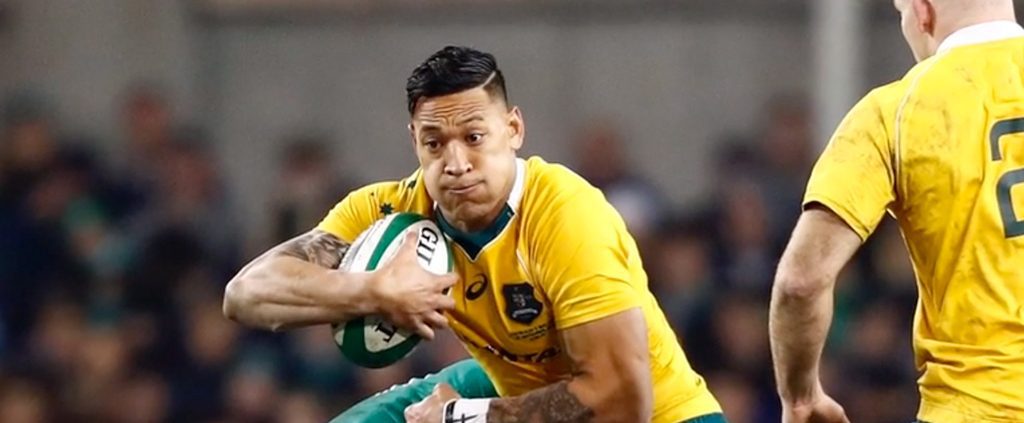Should Israel Folau Have Said What He Said? – Part 2
Screenshot taken from The Irish Times
About a year ago, Israel Folau made a post on his personal Instagram account that polarized the rugby world and the Australian public. In my thoughts on his words, I reflected on his response to a follower’s comment where he communicated that homosexuals would go to hell unless they repented and turned to God.
After the scandal broke out, star rugby playmaker Folau and the Australian Rugby union had negotiations behind closed doors, which led to a four-year extension of his contract, but with a AUD $200,000 decrease in his salary, and the understanding that he would not post more offensive material to his Instagram page.
Fast-forward to a post Folau made last Wednesday (Apr 10). In what appears to be a paraphrase of 1 Corinthians 6:9-11, Folau writes in the post’s caption that, “Those that are living in Sin will end up in Hell unless you repent. Jesus Christ loves you and is giving you time to turn away from your sin and come to him.”

Screenshot taken from Instagram
Because of last year’s scandal, the prominent spot that “Homosexuals” has on the list in Folau’s post has drawn the most scrutiny, tying into a popular narrative that Folau, and perhaps even Christians as a whole, are homophobic.
A number of public figures, including New Zealand’s Prime Minister Jacinda Ardern have been quick to condemn Folau’s post. The Australian Rugby Union announced their intention to terminate Folau’s contract, just months before the Rugby World Cup where Folau would have played a key role in the Wallabies’ hopes of winning.
Folau’s actions may result in the end of his rugby career with the Australian rugby union. With that, he may lose an AUD $1 million a year income, as well as the opportunity to professionally play a sport he loves.
So here we are again, asking the same question we did a year ago. Should Israel Folau have said what he said?
What we can learn from this saga
In response to the scandal, Folau told the Sydney Morning Herald that “my faith in Jesus Christ is what comes first” and that he would stop playing rugby before revoking his words. Folau’s actions have drawn mixed reactions from within the church.
Although there are certainly elements to Folau’s stance that are admirable, such as his commitment to his faith over his sporting career, I wonder if we should lift him up as a “Christian hero” to emulate. Regardless of whether we agree with Folau’s actions, this latest episode is an opportunity for us to reflect on how we as Christians can communicate the gospel in a post-Christian culture, particularly on a public platform like social media.
With social media, anything we post has the incredible ability to reach millions of people in an instant. However, it is also a platform where our posts and comments can easily be taken out of context, misunderstood and can even come across as insensitive, regardless of our intentions. This is why it is so important for us to evaluate how we use it. Here are two questions that came to mind as I reflected on the scandal:
1. What approach should we take in addressing sin?
In the past, Folau has expressed that he has struggled with a number of the sins listed in the post, including drunkenness, adultery, lying, and fornication. But what captured my attention about his approach in his latest Instagram post was that it was more outward-focused rather than inward-focused in the way it addressed sin. The image he posted defined groups of people according to their “sin”, instead of looking at the root cause of these sins—what’s really on the inside of us.
Ultimately, this is the point that Paul is making in 1 Corinthians 6:11, that we are washed, sanctified, and justified of our sin in the name of Jesus. Perhaps if Folau had taken the opportunity to also share about his own past struggles with those sins, and how God’s grace and saving power has delivered him from them, that would’ve been a more effective and helpful approach in drawing people to Christ.
After all, Jesus has saved sinful people like Folau and I, and He can do the same for anyone who comes to Him.
2. Are we speaking up at the right time and place?
Although Christians are called to stand up for our faith, it doesn’t mean that we should do so whenever and however we want to. Folau’s social media saga highlights how important it is that we exercise wisdom and care in knowing exactly how and when to reach out to others with gospel truths.
Topics as serious as the consequences of sin, the reality of hell, and the incredible gift of God’s grace are probably better suited for a one-on-one conversation rather than a meme on an Instagram account. This way, we’ll also be able to interact with the individual on a personal level and address any questions he or she might have about the faith.
In this regard, we can learn from the example of Paul in Acts 17, who took the opportunity provided to him at a specific time and place in the city of Athens to share the truth God had commissioned him to speak—the meeting of the Areopagus, which was a space specifically used to communicate new ideas and philosophies. Paul wisely spoke into the culture of the day, showing his understanding of the culture he was in, even quoting Greek philosophers. And lastly, he communicated the truth of the gospel effectively by sharing about the one true God, who cannot be contained in something physical like an altar. The Holy Spirit was obviously with Paul and his words as many believed in Christ that day (Acts 17:34).
As we seek opportunities to share about our faith, let’s take heed of the apostle Peter’s encouragement for us to “Always be prepared to give an answer to everyone who asks you to give the reason for the hope that you have”, but to also do so with “gentleness and respect” (1 Peter 3:15). Let’s seek the Holy Spirit for His guidance so that like Paul, we can know the best time and place to share the truths of God’s Word to those around us.
An opportunity for Part 3 to be different
I felt disappointed when Part 2 of Folau’s saga broke out—as it appeared that he had not learned the lessons from what had happened the first time round. But upon further reflection, I realized that, I too, often need to learn more than once the lessons God is trying to teach me. So, I will be rooting for Folau and the church as a whole to allow the Holy Spirit to guide us with wisdom and gentleness in our attempts to live lives worthy of His calling.
If Folau’s contract ends up being terminated, he might suffer many forms of losses, but it would also give him a unique opportunity to practice what he preaches. He can show the world that money, material things, and worldly success from a rugby career do not compare with what a relationship with God can give. He can be open about his own sins and struggles. And ultimately, he can show with his words and actions that no matter what sins a person has committed, Jesus’ death and saving grace covers them all.
I will be hoping and praying that if there is a part 3 to Folau’s social media saga, I can write about how Folau has allowed God to change, mold, and guide him to become a humble ambassador of Christ’s love.










I think having a public opinion is not such a bad thing what Israel did was right he voiced his views to the public
We might see him as homophobic but Christian men and women get judged all the time and their faith
The way Israel chose to voice his ideas on the Bible was totally uncalled for
There is no where in the Bible do you see believers outrightly attacking their opponents in a way that draw attention to the situation at hand
Jesus alone had the right to defame his critics and he did in a way that benefited the audience
Saying things like if you don’t repent your going to hell is not in the list outrageous
It’s in the Bible that non believers will suffer in hell
But scriptures tell us that God is not pleased with the demise of the wicked
Christ did not come to condemn the world he came to seek and save the lost
We are not to remain silent in the face of idolatry wickedness and outright sin
But we’re the hands of compassion to a lost and dying world
Black Eyed Peas asked where is the love ?
It’s in every heart the beard the mark of the Savior
It beats inside the chest of those who view a corrupted generation with the eyes of love
We are the hands
We are the feet
We reach out and touch someone with sympathy and empathy
Was he pressured into saying that?